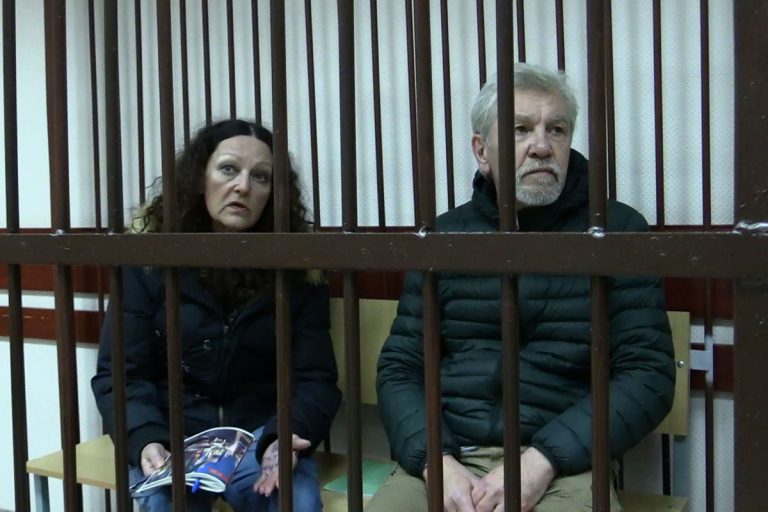On February 24, 2022, when Russia launched a full-scale invasion of Ukraine, artist Lyudmila Razumova and her husband Alexander Martynov had long been following politics. Living in the village of Novozavidovsky in the Tver region, they tried to maintain an active civic position, sharing news about the war, investigations into corruption, state repression, footage of destroyed cities, and interviews with captured soldiers on social media.

As a form of protest, the couple began leaving anti-war graffiti on prominent buildings: slogans like “Putler kaput” with portraits of Putin and Hitler. Their final graffiti before arrest was “Ukraine, forgive us” on a monument commemorating military glory, the “Katyusha” rocket launcher.
Arrest and Charges
On March 23, 2022, Alexander Martynov, working as a taxi driver, was approached by police and asked to come with them to the station. At the same time, a patrol arrived at Lyudmila Razumova’s home and took her to the same police department.
The couple was accused of spreading “fake news” about the army and vandalism. The case included testimonies from building owners with graffiti, screenshots from social media, and Lyudmila’s reposts criticizing the Russian authorities. Initially, Alexander and Lyudmila did not realize that their arrest would last for many years.
Alexander had always held liberal views, valuing perestroika and seeing the 1990s as a chance for renewal. Lyudmila, who spent her childhood in the Khabarovsk region, had dreamed of becoming a costume designer but life led her elsewhere: moving across military garrisons, living in Poland, where she first seriously reflected on politics.
Court: Honesty vs. “Suspended Sentence”
Initially, the couple was assigned a state-appointed lawyer who promised a “suspended sentence” but insisted on lying and expressing remorse. Lyudmila refused and decided to speak honestly.
In court, she said:
“No, we don’t need our weapons to have no analogs in the world; we just want them to be worthy of us. But for now, we only have ‘greatness’ and a sea of vodka. Greatness—for pride, vodka—to lift the spirit. And those who disagree are sent to prison, their lives and destinies broken.”
Following the lawyer’s advice, Alexander tried to “lay low” and not draw attention to his position.
The trial was prolonged: the court repeatedly reopened investigations due to new written witness statements, forcing the couple to repeat their final statements. Ultimately:
-
Alexander Martynov — 6.5 years in a general-regime colony.
-
Lyudmila Razumova — 7 years in a colony.
First Months in Pre-Trial Detention: Loneliness and Survival
The first six months in Tver’s SIZO No. 1 were unbearable for Lyudmila. The hardest part was isolation: she was kept in one of the strictest cells, with almost no contact with other prisoners.
Alexander and Lyudmila hardly communicated: Martynov believed that “laying low” was the best strategy. Lyudmila, on the other hand, could not remain silent about the war.
Over time, Lyudmila began corresponding with journalists and friends to document violations and share her experience in pre-trial detention. In her letters, she described daily hardships: cold, damp cells, poor food, sewage issues, and limited access to medical care.
Hunger Strikes, Solitary Confinement, and Strict Regimes
In February 2025, Lyudmila declared a hunger strike demanding hospitalization. Despite the health risk, her requests were only partially met.
Several incidents occurred in SIZO:
-
A conflict with another prisoner led to a criminal case for “minor bodily harm.”
-
Lyudmila was transferred to strict conditions (SUS) — basement cells without windows, cold and damp.
Even in these conditions, she continued to draw and write letters, which helped maintain her mental health and sense of dignity.
Personal Relationships and Family Consequences
During their imprisonment, tensions grew between the couple. Lyudmila criticized her husband for caution, calling it “betrayal,” while Alexander felt that her political statements worsened life for both of them.
The family lost support:
-
Alexander’s mother died during the trial, the only close family member supporting him.
-
Lyudmila’s youngest daughter was taken by her father.
-
Lyudmila’s former husband and children sent letters and parcels but did not attend court hearings.
Public Support and Moral Victory
Since the case received media attention, the number of letters sent to Lyudmila has increased significantly. She calls these people “ours,” referencing Kipling: “We are of one blood, you and I.”
Even in solitary confinement, Lyudmila sees solidarity in the prison staff, who, according to her, work there not out of malice but to feed their families.
She believes her moral victory lies in honesty and resilience:
“My children, grandchildren, and descendants will never be ashamed of me.”
Alexander, though less expressive, also draws hope from letters and public support, believing in a better future.
Conclusion: Resilience and Example for Future Generations
The story of Lyudmila Razumova and Alexander Martynov is a striking example of how civic engagement clashes with the Russian justice system. Their sentences demonstrate that repression can reach the most senior and peaceful citizens, while personal courage and honesty allow maintaining human dignity even in the harshest conditions.
Their experience also highlights the importance of public attention and support: letters, publications, and moral solidarity help prisoners endure isolation and retain hope for the future.


